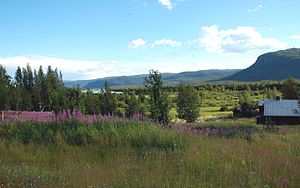Kvikkjokk
You can help expand this article with text translated from the corresponding article in Swedish. (July 2010) Click [show] for important translation instructions.
|
Kvikkjokk | |
|---|---|
 | |
| Coordinates: 66°57′N 17°43′E / 66.950°N 17.717°E | |
| Country | Sweden |
| Province | Lapland |
| County | Norrbotten County |
| Municipality | Jokkmokk Municipality |
| Population (2007) | |
| • Total | 16 |
| Time zone | UTC+1 (CET) |
| • Summer (DST) | UTC+2 (CEST) |
Kvikkjokk (Quickjock) (Swedish pronunciation: [ˈkvɪ̌kːjɔk])[1] is a small village situated in Jokkmokk Municipality, Norrbotten County, Sweden. It is located 120 km northwest of Jokkmokk.[2] Several hiking trails start in Kvikkjokk. Kungsleden passes through the village and it is a popular starting point for hikers going into Sarek National Park.
Climate
[edit]Kvikkjokk has a subarctic climate (Köppen Dfc). It is one of the most continental climates of the Nordics, with 20 °C (68 °F) summer highs and −20 °C (−4 °F) winter lows in terms of averages. Areas to its north that share the proximity to the Norwegian border have greater maritime moderation with milder winters and quite a bit cooler summers. Kvikkjokk instead is quite reminiscent of Lapland's largest town Kiruna in terms of climate, only with wider temperature swings. The record low temperature of −43.6 °C (−46.5 °F) was registered on 3 January 2024.[3][4]
| Climate data for Kvikkjokk–Årrenjarka (2002–2022 averages); extremes since 1901 | |||||||||||||
|---|---|---|---|---|---|---|---|---|---|---|---|---|---|
| Month | Jan | Feb | Mar | Apr | May | Jun | Jul | Aug | Sep | Oct | Nov | Dec | Year |
| Record high °C (°F) | 9.0 (48.2) |
9.0 (48.2) |
12.0 (53.6) |
17.4 (63.3) |
27.2 (81.0) |
30.9 (87.6) |
33.1 (91.6) |
29.1 (84.4) |
24.2 (75.6) |
16.0 (60.8) |
12.8 (55.0) |
9.5 (49.1) |
33.1 (91.6) |
| Mean maximum °C (°F) | 3.9 (39.0) |
5.4 (41.7) |
7.2 (45.0) |
12.1 (53.8) |
20.3 (68.5) |
25.2 (77.4) |
26.9 (80.4) |
24.8 (76.6) |
18.4 (65.1) |
11.5 (52.7) |
5.7 (42.3) |
4.7 (40.5) |
28.3 (82.9) |
| Mean daily maximum °C (°F) | −10.0 (14.0) |
−7.2 (19.0) |
−0.8 (30.6) |
5.0 (41.0) |
10.7 (51.3) |
16.8 (62.2) |
20.1 (68.2) |
17.6 (63.7) |
11.6 (52.9) |
4.0 (39.2) |
−3.4 (25.9) |
−6.4 (20.5) |
4.8 (40.7) |
| Daily mean °C (°F) | −14.9 (5.2) |
−12.7 (9.1) |
−6.8 (19.8) |
−0.4 (31.3) |
5.2 (41.4) |
11.0 (51.8) |
14.3 (57.7) |
12.0 (53.6) |
7.0 (44.6) |
0.2 (32.4) |
−7.1 (19.2) |
−11.3 (11.7) |
−0.3 (31.5) |
| Mean daily minimum °C (°F) | −20.0 (−4.0) |
−18.1 (−0.6) |
−12.9 (8.8) |
−5.8 (21.6) |
−0.4 (31.3) |
5.1 (41.2) |
8.5 (47.3) |
6.4 (43.5) |
2.4 (36.3) |
−3.6 (25.5) |
−10.8 (12.6) |
−16.1 (3.0) |
−5.4 (22.2) |
| Mean minimum °C (°F) | −35.1 (−31.2) |
−34.5 (−30.1) |
−29.0 (−20.2) |
−19.4 (−2.9) |
−7.1 (19.2) |
−2.0 (28.4) |
1.3 (34.3) |
−0.9 (30.4) |
−5.0 (23.0) |
−14.3 (6.3) |
−23.8 (−10.8) |
−30.8 (−23.4) |
−37.6 (−35.7) |
| Record low °C (°F) | −43.6 (−46.5) |
−42.5 (−44.5) |
−39.0 (−38.2) |
−30.0 (−22.0) |
−19.0 (−2.2) |
−6.6 (20.1) |
−3.0 (26.6) |
−4.5 (23.9) |
−10.5 (13.1) |
−25.6 (−14.1) |
−35.7 (−32.3) |
−40.4 (−40.7) |
−43.6 (−46.5) |
| Average precipitation mm (inches) | 42.7 (1.68) |
35.1 (1.38) |
24.1 (0.95) |
22.2 (0.87) |
41.1 (1.62) |
54.2 (2.13) |
90.2 (3.55) |
71.7 (2.82) |
59.1 (2.33) |
45.4 (1.79) |
42.6 (1.68) |
49.2 (1.94) |
577.6 (22.74) |
| Average extreme snow depth cm (inches) | 75 (30) |
89 (35) |
85 (33) |
76 (30) |
36 (14) |
0 (0) |
0 (0) |
0 (0) |
0 (0) |
11 (4.3) |
33 (13) |
59 (23) |
95 (37) |
| Source 1: SMHI Open Data[5] | |||||||||||||
| Source 2: SMHI climate data 2002–2022[6][4][3] | |||||||||||||


References
[edit]- ^ Jöran Sahlgren; Gösta Bergman (1979). Svenska ortnamn med uttalsuppgifter (in Swedish). p. 15.
- ^ "Kvikkjokk". Nationalencyklopedin (in Swedish). Retrieved 1 August 2010.
- ^ a b Ebba Torstensson, Ebba (January 3, 2024). "Kallaste januarinatten på 25 år". aftonbladet.se. Aftonbladet. Retrieved January 4, 2024.
- ^ a b https://twitter.com/Ventuskycom/status/1742457772690555003
- ^ "Öppen Data för Kvikkjokk-Årrenjarka" (in Swedish). Swedish Meteorological and Hydrological Institute. Archived from the original on 2019-04-11. Retrieved 2019-05-16.
- ^ "SMHI climate data 2002–2022" (in Swedish). SMHI. 5 March 2023.


